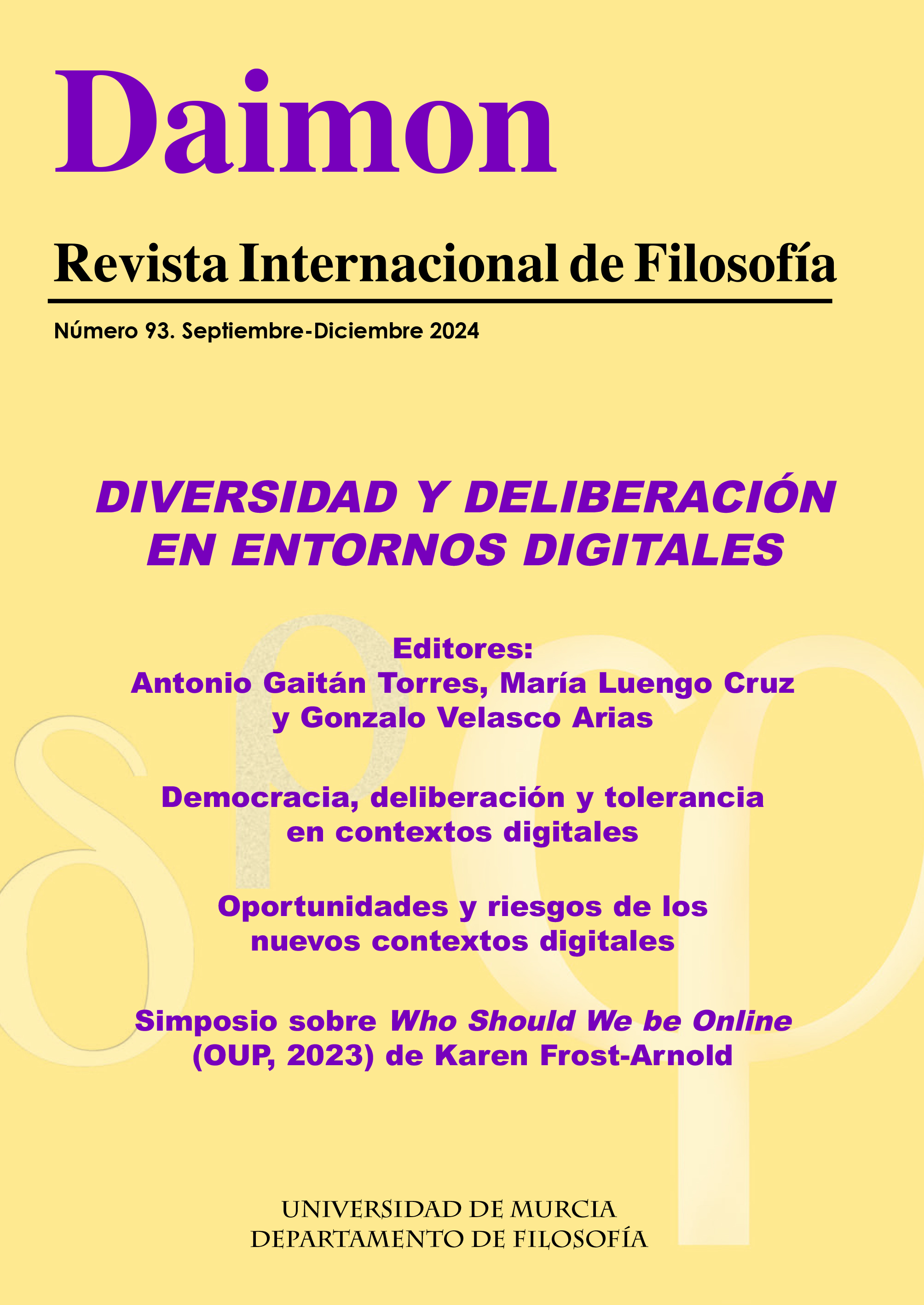What about my true beliefs? On the construction of our collective memory online
Abstract
Aplicando la noción de 'memoria colectiva' de Mills, Frost-Arnold argumenta que un exceso de creencias falsas en línea (fake news) puede condicionar la memoria que compartimos como colectivo. Aquí sugiero, siguiendo la caracterización original de ‘ignorancia’ de Mill, que la construcción y mantenimiento de nuestra memoria colectiva también es vulnerable a cierta falta o ausencia total de creencias verdaderas en línea. Propongo que debemos investigar estas creencias atendiendo a dos cuestiones: en primer lugar, a instancias de conocimiento que están subrepresentadas y, en segundo lugar, a formas no proposicionales de conocimiento. El primer problema se aborda en la sección 1, donde exploro diferentes formas en las que algunas creencias pueden no alcanzar el ámbito digital debido a su estatus minoritario. El segundo problema es el foco de atención en la sección 2, donde se consideran formas no dominantes de conocimiento: el saber-cómo y el conocimiento por familiaridad.
By applying Mills’ notion of ‘collective memory’, Frost-Arnold argues that an excessive number of false beliefs online (fake news) can condition the memory that we share as a collective. Here I suggest, following Mill’s original characterization of ‘ignorance’, that the construction and maintenance of our collective memory is also vulnerable to some lack of or total absence of true beliefs online. I suggest we must investigate these beliefs attending to two issues: firstly, instances of knowledge that are underrepresented, and secondly, non-propositional forms of knowledge. The first problem is addressed in section 1, where I explore different ways in which some beliefs might not reach the online sphere, due to their minoritarian status. The second problem is my focus on section 2, which entails the consideration of non-dominant forms of knowledge: knowledge-how and knowledge by acquaintance.
Downloads
-
Abstract457
-
PDF 132
-
HTML 35
Riferimenti bibliografici
Bengson, J., & Moffett, M. A. (2011). Nonpropositional Intellectualism. In J. Bengson & Moffett, Marc A (Eds.), Knowing how: Essays on knowledge, mind, and action, 161-195. Oxford University Press.
BonJour, L. (2001) Toward a Defense of Empirical Foundationalism. In Michael Raymond DePaul (ed.), Resurrecting Old-Fashioned Foundationalism (pp. 21-38). Lanham: Rowman and Littlefield.
Brewer, B. (2011). Perception and its Objects. Oxford: Oxford University Press.
Carter, J. A., & Navarro, J. (2017). The Defeasibility of knowledge-how. Philosophy and Phenomenological Research, 95(3), 662-685. https://doi.org/10.1111/phpr.12441
Carter, J. A., & Pritchard, D. (2015). Knowledge-How and Epistemic Luck. Noûs, 49(3), 440-453.
Dretske, F. (1981). The pragmatic dimension of knowledge. Philosophical Studies: An International Journal for Philosophy in the Analytic Tradition, 40(3), 363-378.
Du Bois, B.W.E. (1897), The Strivings of the Negro People, The Atlantic Monthly, August: 194–197.
Duncan, M. (2021). Acquaintance. Philosophy Compass, 16(3).
Frost-Arnold, K. (2023). Who Should We be Online?: A Social Epistemology for the Internet. Oxford University Press.
Fumerton, R. (1995). Metaepistemology and Skepticism. Lanham: Rowman and Littlefield.
Haraway, D. (1988). Situated Knowledges: The Science Question in Feminism and the Privilege of Partial Perspective. Feminist Studies, 14(3), 575. https://doi.org/10.2307/3178066
Harding, S. (1992). Rethinking Standpoint Epistemology: What is «Strong Objectivity?». The Centennial Review, 36(3), 437-470.
Hasan, A. & Fumerton, R. (2020, Spring) Knowledge by Acquaintance vs. Description. The Stanford Encyclopedia of Philosophy. Edward N. Zalta (ed.), URL = <https://plato.stanford.edu/archives/spr2020/entries/knowledge-acquaindescrip/>.
Hawley, K. (2010). Testimony and knowing how. Studies in History and Philosophy of Science Part A, 41(4), 397-404.
Mills, C. (2007). “White ignorance”. In Sullivan, S. & Tuana, N. (Eds) Race and epistemologies of ignorance, (pp. 26-31). State University of New York Press.
Medina, J. (2013). The epistemology of resistance: Gender and racial oppression, epistemic injustice, and the social imagination. Oxford University Press.
Navarro, J. (2021). Knowing how to. Routledge Encyclopedia of Philosophy. URL = https://www.rep.routledge.com/articles/thematic/knowing-how-to/v-2#
Pavese, C. (2017). Know-how and gradability. Philosophical Review, 126(3), 345-383.
Poston, T. (2009). Know how to be Gettiered? Philosophy and Phenomenological Research, 79(3), 743-747. https://doi.org/10.1111/j.1933-1592.2009.00301.x
Poston, T. (2016). Know how to transmit knowledge? Noûs, 50(4), 865-878
Russell, B. (1911). Knowledge by acquaintance and knowledge by description. Proceedings of the Aristotelian Society, 11, 108–128.
Russell, B. (1912). The problems of philosophy. London, UK: Thornton Butterworth Limited
Shotwell, A. (2017). Forms of Knowing and Epistemic Resources. In Kidd, I. J., Medina, J., & Pohlhaus Jr, G. (Eds.). The Routledge handbook of epistemic injustice. Routledge, Taylor & Francis Group, 79-88
Sgaravatti, D., & Zardini, E. (2008). Knowing How To Establish Intellectualism. Grazer Philosophische Studien, 77(1), 217-261. https://doi.org/10.1163/18756735-90000849
Sosa, E. (2011). Knowing Full Well. Princeton: Princeton University Press.
Tye, M. 2009. Consciousness Revisited. Cambridge: MIT Press
Copyright (c) 2024 Daimon

Questo articolo è soggetto a licenza Creative Commons Attribution-NonCommercial-NoDerivatives 3.0 International License.
Las obras que se publican en esta revista están sujetas a los siguientes términos:
1. El Servicio de Publicaciones de la Universidad de Murcia (la editorial) conserva los derechos patrimoniales (copyright) de las obras publicadas, y favorece y permite la reutilización de las mismas bajo la licencia de uso indicada en el punto 2.
2. Las obras se publican en la edición electrónica de la revista bajo una licencia Creative Commons Reconocimiento-NoComercial-SinObraDerivada 3.0 España (texto legal). Se pueden copiar, usar, difundir, transmitir y exponer públicamente, siempre que: i) se cite la autoría y la fuente original de su publicación (revista, editorial y URL de la obra); ii) no se usen para fines comerciales; iii) si remezcla, transforma o crea a partir del material, no podrá distribuir el material modificado.
3. Condiciones de auto-archivo. Se permite y se anima a los autores a difundir electrónicamente las versiones pre-print (versión antes de ser evaluada) y/o post-print (versión evaluada y aceptada para su publicación) de sus obras antes de su publicación, ya que favorece su circulación y difusión más temprana y con ello un posible aumento en su citación y alcance entre la comunidad académica. Color RoMEO: verde.











